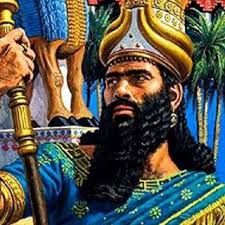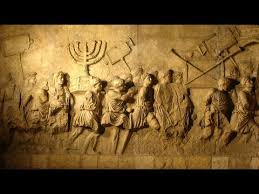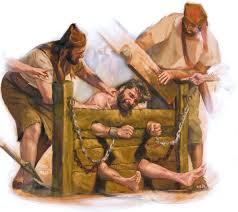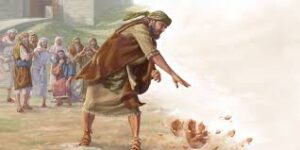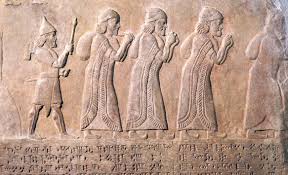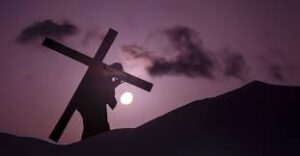De – The Cup of God’s Wrath Against the Gentile Nations 25: 15-38
The Cup of God’s Wrath
Against the Gentile Nations
25: 15-38
The cup of God’s wrath against the Gentile nations DIG: Why is God’s wrath likened to a cup of wine (see Isaiah 51:17-23; Revelation 14:8 and 18:6)? What effect will it have on those who drink it? Is this what they would suspect? Who drinks from the cup first and why (25:18)? Who next (25:19)? Who last (25:26)? Try to locate the other nations on a map of ancient Palestine. Why will God punish Gentiles with the sword and mighty storm of the invasion by Babylon? What “charges” will God bring (2:5-9 and 23:35)? What will happen to the world leaders (25:34-38)? How is their fate like that of Judah’s leaders (21:1 to 23:7)?
REFLECT: If you were compiling a list of nations to punish, which ones would top the list? Why? Who would not have to drink the cup? Is God’s treatment of Judah and the Gentile nations fair? How does Yeshua Messiah judge them (Isaiah 11:10)? Does the fact that YHVH will someday avenge every evil deed and punish all evildoers (Revelation 20:11-12) comfort you, or scare you? Why?
605/604 BC during the eleven-year reign of Jehoiakim
The picture of the cup of wrath is a common figure used in the Scriptures and is a symbol of God’s wrath (Job 21:20; Psalm 60:3; Isaiah 51:17 and 22; Jeremiah 25:15-16; 49:12, 51:7; Lamentations 4:21; Ezeki’el 23:31-35; Revelation 14:8 and 10, 16:19, 17:4, 18:3 and 6; and it is also possible that this is the cup referred to in Mark 10:39, 14:36 and John 18:11). This cup has been consistently presented to Judah since Chapter 2 until now. But here, the cup will turn to a different direction other than Judah herself. Now it is the Gentile nations turn to drink of it. Now Jeremiah begins to fulfil part of his other call that he received in 1:10. The prophet was not only to be a prophet to the Jews, but he was also to be a prophet to the Gentile nations. If God presides over Judah’s future, then He must also govern the nations. They are not autonomous. They must finally answer to the LORD. They must answer to YHVH’s good news for Judah, whom ADONAI loves.
This is what the LORD, the God of Isra’el, said to me, “Take from My hand this cup filled with the wine of My wrath and make all the nations to whom I send you drink it (to see link click Dg – Prophecies Concerning the Gentile Nations). When they drink it, they will stagger and go mad because of the sword I will send among them” (25:15-16). The effect of drinking this cup is that those nations will drink of God’s wrath, causing them to stagger and go mad. More to the point, it means death.
The list of nations: These verses constitute a roll call of the Gentile nations of the ancient Near East. All these nations were under judgment. So I took the cup from ADONAI’s hand and made all the Gentile nations to whom He sent me drink it:
First, consistent with what we have seen in Jeremiah, the list begins with Jerusalem and Judah. Judgment begins with God’s people: For it is time for judgment to begin with God’s household; and if it begins with us, what will the outcome be for those who do not obey the gospel of God (First Peter 4:17). Jerusalem and the towns of Judah, its kings and officials, to make them a ruin and an object of horror and scorn and cursing, as they are today (25:17-18). Judgment does not stop with God’s household, however, it moves out in every direction. The first nation mentioned after Judah is Egypt.
Pharaoh king of Egypt, his attendants, his officials and all his people, and all the foreign people there (see Dh – A Message Concerning Egypt). Jeremiah is particularly hostile toward Egypt and regards her as a formidable foil to YHVH’s purpose.
All the kings of Uz, an Aramean tribe, probably east or northeast of Edom not far from Egypt (Job 1:1; Lamentations 4:21);
All the kings of the Philistines (see Di – A Message Concerning the Philistines), those of Ashkelon, Gaza, Ekron, and the people left at Ashdod. Another of the Philistine cities, thirty-five miles north of Gaza. At the time this prophecy was given, Ashdod had undergone a siege by the Egyptian Pharaoh Psammetichus for 39 years.
Then Jeremiah turns to the East Bank and the Transjordan region; Edom (see Dn – A Message Concerning Edom), Moab (see Dj – A Message Concerning Mo’ab) and Ammon (see Dm – A Message Concerning Ammon);
All the Phoenician kings, of which Tyre and Sidon were the two key cities; the kings of the coastlands across the sea like Tarsus;
All the kings of Arabia, Dedan, Tema, Buz and all those desert tribes who are in distant places all that have the corner of their hair cut off, who used the hair in the worship of the stars and planets. They also trimmed their beards round, which was forbidden to the Jews. It was also an ancient superstitious custom to cut off the hair at the death of friends and throw it into the sepulcher on the corpse. It was sometimes laid on the face and breast of the deceased as an offering to the pagan gods.203 And all the kings of the foreign people who live in the desert (see Dp – A Message Concerning Kedar and Hazor: the Arab Tribes). They were all different races that attached themselves to Isra’el (Ex 12:28), but God wanted Isra’el to live separate from other peoples (Neh 13:3).
Now the prophet turns further east and northeast to all the kings of Zimri, Elam (see Eh – A Message Concerning Elam) and Media; and all the kings of the north, near and far, one after the other. No one knows where Zimri is, but it is only found here in the Bible. It has been connected with Zimra (Genesis 25:2), a son of Abraham and Keturah.
And Jeremiah summarizes here . . . all the kingdoms on the face of the earth.
Last on the list is Babylon. It is almost as if the list deliberately holds off this name for dramatic effect. No nation would be immune, not even mighty Babylon. For the Jews in exile, the inclusion of Babylon in the list for judgment is decisive. This nation that seemed beyond all accountability is judged. And in that judgment, Y’hudah would have a basis for a future and hope. After all of them, the king of Sheshach (an atbash cryptogram for Babylon) will drink the cup of wrath too (25:19-26, also see 51:41). An atbash was a code in which the letters of a name counted from the end of the alphabet are substituted for the corresponding letters from the beginning of the alphabet. For example, in English the letter “z” would replace the letter “a,” the letter “y” would replace the letter “b,” and so on. The name “Abby” as an atbash would become “zyyb.” Since Sheshach is a Hebrew atbash the consonants become “bbl,” which is the spelling for Babylon (25:1). God would judge Babylon after judging the other nations. Because he had already mentioned Babylon’s judgment (25:12-14).204 It is employed because either at the time this verse was written it was dangerous to speak of the fall of Babylon in plain language. To the Hebrew ear the name would suggest “humiliation.”
The command to drink: You are to say to them, “Here is what ADONAI-Tzva’ot, the God of Isra’el, says: Drink until you’re so drunk that you throw up, fall down, and never get up again, because of the sword I am sending among you!” If they refuse to take the cup from your hand and drink it, then say to them, “Here is what ADONAI-Tzva’ot says: You must drink! No choices are given. For look – if I am bringing disaster on the city that bears My own name, do you expect to go unblemished? Yes, I will summon a sword for all the inhabitants of the earth,” says ADONAI (25:27-29 CJB). Jeremiah’s Jewish audience could be assured because if God punished the Israelites, He would certainly punish the Gentiles. If He would punish Tziyon, which was called by God’s name, He would certainly punish other cities that were not called by God’s name.205

The interpretation: As for you, Yirmeyahu, prophesy all these words against them; say to them, “ADONAI is raising His voice from His heavenly dwelling place, roaring with His might, a picture of the Lion of the Tribe of Judah roaring (Hosea 11:10; Joel 3:16; Amos 1:2 and 3:8) against His own Land, shouting out loud, as He treads the winepress of His wrath (see the commentary on Revelation Dw – They Were Trampled in the Winepress and Blood Flowed as High as the Horses Bridles), against everyone living on earth (25:30 CJB). The sound of indignation resounds to the ends of the earth (the sounds of war see Amos 2:2), for ADONAI is indicting the nations, about to pass judgment. We have gone from a roar, to a shout, to indignation. YHVH had a lawsuit (rub) against the nations (Jeremiah 25:31).
A description of the near historical judgment against the nations: Thus says the LORD of heaven’s angelic armies, “Disaster is spreading from nation to nation, a mighty tempest is being unleashed from the farthest ends of the earth” (25:32). On that day, those killed by ADONAI will be strewn from one end of the earth to the other; they will not be mourned or gathered or buried, but will lie on the ground like dung (25:33 CJB). Earlier Jeremiah said this would be true of the Jews in the judgment of Judah, but later it would also be true of the Gentiles.
“Wail, false shepherds (or the leaders of these nations)! Cry! Wallow in the dust, you lords of the flock! For the days for your slaughter have come. I will break you into pieces, and like a prized vase you will fall” (25:34 CJB).
The false shepherds have no way to flee, [leaders] of the flock no way to escape. Disaster would be inescapable. Hear the cry of the shepherds, the wails of [leaders] of the flock! Why do they cry, their whole land is desolate; like God did with Judah. For ADONAI is destroying their pasture, the peaceful grazing grounds are silenced, because of the LORD’s fierce anger. The chapter ends with the picture of the Lion of the Tribe of Judah. Like a lion, He has abandoned His lair; for their Land has become desolate because of the oppressor’s fierce sword and because of ADONAI’s fierce anger (25:35-38 CJB).
In the face of massive imperial power and cynical disregard of the moral dimension of human reality, God’s sovereign rule is the only ground for God’s people. Without the rule of YHVH, Judah is at the disposal of the Gentile nations. This is no less true today than it was then! Because of ADONAI’s rule, however, Judah has a possibility to exist. The Bible pictures that the cynical, ruthless power of the Gentile nations is very real in the world. But such a power is not the final reality. The final reality is in the One who uproots and tears down, who builds and plants (1:10). God is at work on both of these tasks. There is a massive cup of wrath proportionate with massive human sin. Jeremiah shows Ha’Shem taking this sin with utmost seriousness.
But there is, however, another cup (see the commentary on The Life of Christ Kk – The Third Cup of Redemption) which is a cup of healing. It is then promised that the healing of ADONAI will overcome the wrath caused by Ha’Shem. In Jeremiah the cup of healing is held in abeyance. The people of God live in the midst of both cups . . . one of the wrath of ADONAI and the other of the healing of ADONAI.206 We wait for the blessed hope (Titus 2:13) who will come again (see the commentary on Revelation Et – The Second Coming of Jesus Christ).



